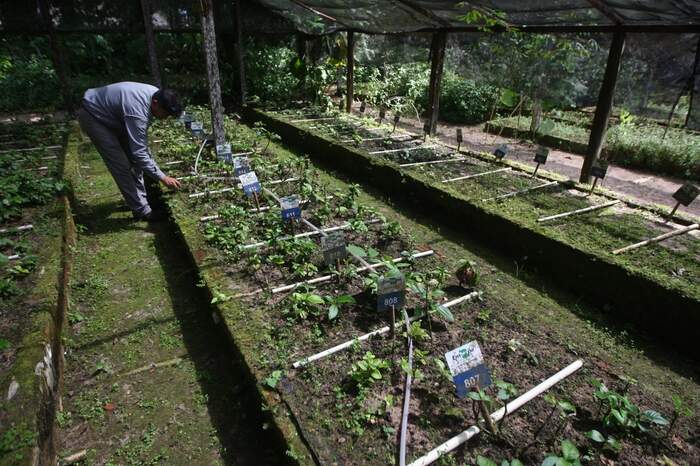Healing that leaves the Amazon Forest to the world
Researchers at the Federal University of Pará (UFPA) have been dedicated for decades to seeking knowledge about the power of medicinal plants in the region and helping to revolutionize the treatment of diseases such as Alzheimer’s and diabetes

From the interior of the Federal University of Pará (UFPA), the largest public university in the North of Brazil and one of the three largest in the country, researchers have been dedicated for decades to seeking – and spreading around the world – knowledge about the power of healing plants in the Amazon. It is not by chance that they have already been successful in discoveries that may, in the future, revolutionize the treatment of diseases such as Alzheimer's, post-covid-19 memory loss, complications from stroke, diabetes and other ailments.
Listen to the comment on this news:
On the university campus in the Guamá neighborhood, in Belém, the capital of Pará, among the various active research groups is the Bioprospection of Active Molecules of the Amazon Flora, which has already discovered 30 new substances extracted from native plants in the Amazon, which works on two fronts coordinated by doctors Gilmara Bastos and Milton Nascimento.
Another strategic project is the development of herbal products and services within the scope of public policies, with an interdisciplinary approach, coordinated by professor Wagner Luiz Ramos Barbosa, from the Faculty of Pharmacy. The project works to contribute to public policies with the Ministry of Health (MS). “The university itself does not produce the medicines, it produces the knowledge both to support public sector investments in new medicines, as well as public-private partnerships for taking advantage of the results of these researches”, emphasizes the Doctor of Natural Sciences.
Although investments in research in Brazil, made by the government, have recently fallen short of what is necessary to leverage new studies and discoveries, UFPA has a strong work in the studies of plants, foliage, seeds, oils and even vegetable fungi. A good example is the seeds of cupuaçu and cocoa, two well-known and appreciated Amazonian fruits. Substances used to feed fish are extracted from the cocoa kernel; and cupuaçu, for humans, is also a nutraceutical substance, that is, a food supplement with antioxidant properties.
From aloe vera, another well-known plant in the Amazon, in addition to aloe vera, which has moisturizing and medicinal properties, polysaccharides are also extracted, used in a dressing for burns that helps in skin replacement, and which is already being studied for the production of medicine, of large-scale use.
Other important studies pointed out by Wagner Barbosa may bring a new path to the treatment of diabetes, one of the most frequent chronic diseases in the world, and with consequences on the patient's quality of life. These are plants with hypoglycemic activity and also plants that reduce the other effects caused by diabetes. Among them is the plant popularly known as “pata de vaca” (Bauhinia spp), whose research from Parma was carried out in part at the University of Parma, in Italy.
"Our line of research focuses on promoting health in the Amazon, collecting data on traditional knowledge in the use of medicinal plants" - Iracely Rodrigues, professor with a PhD in Amazon Environmental Resources.
Other important plants in research against diabetes are ajiru (Chrysobalanaceae) and the melon from São Caetano de Odivelas, which is an aqueous extract that shows effectiveness in treating areas of the skin affected by scabies and is still widely used by people with diabetes .
Wagner Barbosa also mentions as a highlight the research carried out with a type of willow from the Amazon that has rich antispasmodic, analgesic and anti-inflammatory properties. Of the research that has already reached the final stage, he highlights that of the Marupazinho plant (Eleutherine plicata), whose work from Pará was published, being the candidate species to integrate the Herbal Medicines Form published by Anvisa and Farmacopeia Brasileira.
The researchers interviewed in the article made a point of stressing that today all UFPA experiments are being carried out within the biosafety requirements against covid-19. In addition, the research on mice by the Bioprospecting Amazon Flora Active Molecules research group, carried out at the Neuroinflammation Laboratory of the Institute of Biological Sciences (ICB) in partnership with the Experimental Neuropathology Laboratory (LaNEx), located at the João de Barros Barreto University Hospital (HUJBB) from UFPA, are approved by the UFPA Animal Ethics Committee.
Plant studies take place in several municipalities in Pará
Another research group that has been investigating the popular knowledge of plants in riverside communities is the Education, Environment and Health Laboratory (Lemas), located at the University Campus of Bragança at UFPA, in partnership with the Federal Rural University of Amazônia (Ufra /Capanema) and the Postgraduate Program in Anthropogenic Studies in the Amazon (PPGEAA/UFPA/Castanhal). Together, the researchers investigate traditional knowledge about plant resources for medicinal use in communities on the lower course of the Caeté River.
According to the coordinator of Lemas, the professor with a PhD in Amazon Environmental Resources, Iracely Rodrigues, since 2016, she and her students have already studied more than 70 native plants. "Our line of research focuses on promoting health in the Amazon, collecting data on traditional knowledge in the use of medicinal plants, and then researching data on taxonomy, phytochemistry, active principles, safety, local concepts and symbolism, uses, dosages, everything which involves the medication, which ends up being an alternative therapy for the community”, he detailed.
"Those who suffer from the lack of investment in research are the population that loses in scientific knowledge" - Gilmara Bastos, researcher.
According to Iracely, the most important study was carried out in 2017, covering communities in Bragança and Augusto Corrêa, a region where medicinal and therapeutic plants are used by the population. “There, it is quite common for people to treat diseases with alternative therapy. These uses have been managed through mechanisms, for the most part, unknown and transmitted orally between the usual generations. The characteristics of uses are specific to each community. Sometimes, a community close to another uses the plant differently, so the validation of the effectiveness of these natural medicines depends a lot on surveys of its use. So, it was by recording this knowledge of traditional communities and realizing the need to prove the effectiveness of these uses that the research project was born”, explained the doctor.
Among the plants already studied, they stood out as the most popular among traditional people: Nambu-tutano, fighting diarrhea caused by amoebiasis; Canarana, against kidney stones; and Insulin, helping to treat diabetes. The three studies were carried out analyzing the use of vegetables by the community of Ponta do Urumajó, located in the rural area of the municipality of Augusto Corrêa, northeast of Pará. The surveys, carried out by Lemas students and researchers, were published in the Research, Society and Development Magazine in 2020.
In the work of Deyvison Santos, as a master of the group, he registered the traditional use of Eleutherine plicata Herb, the scientific name of Nambu-tutano, presenting scientific data that agree with popular usage. According to researchers, the plant has chemical compounds, such as: naphthoquinones and uterine isoele, present in the plant bulbs and probably responsible for the therapeutic action acting against the amebiasis. “The community's inhabitants use Nambu-tutano tea to treat diarrhea caused by the disease, drinking 300 ml of the drink only once a day until the symptoms disappear”, explained the researcher.
Master Jones Moraes was responsible for the study of the plant popularly known as Insulin, which has been shown to be effective in the treatment of diabetes. In his work, he characterized the traditional therapeutic and medicinal uses of the plant Cissus verticillata by riverine people. “Studies on pharmacological actions have shown that it has anti-diabetic activities. Researchers prove that the hypoglycemic action in this plant is due to the presence of Flavonoids in its chemical composition and Tyramine is also highlighted as the active principle responsible for the hypoglycemic action in the species”, explained the scientist.
Finally, researcher and master's student Gabrielle Falcão investigated the use of the plant popularly known as Canarana, Costus arabicus L., in the treatment of kidney stones.
According to his study, the scientific literature confirms that the roots have anti-urolytic effects due to a polysaccharide, validating the use of the species in renal treatment. “People use the tea from this plant to combat urinary symptoms and kidney pain. Those who are in pain take it three times a day until they feel better”, said the student.
Promising research in Alzheimer's disease
One of the most promising researches, coordinated by doctors Gilmara Bastos and Milton Nascimento, found neurogenic properties in the root of Physalis angulata, popularly known as Camapu. According to the pre-clinical results of the study, the substance induces stem cells to form new neurons. “All the experiments we did with Camapu resulted in neurogenesis, a beneficial activity to enhance memory, improve cognitive capacity, among other benefits”, she says, citing the example of people who suffer from Alzheimer's disease. “The patient loses part of his neurons in the hippocampus, and our research shows that it is precisely in the hippocampus that new neurons stimulated by the active principle of Camapu are born”, explains the researcher.
Despite this great discovery having been announced in 2013, the studies did not advance due to lack of funds and equipment. The tests carried out so far have been carried out on animals, the so-called pre-clinical tests, however, the university professor said that the group hopes to be able to move on to the next step and carry out clinical tests with extracts from Camapu and other vegetables.
“That is why it is important to continue with studies of this plant, as we need to carry out new experiments and, for all that, our public university needs more incentives. Those who suffer from the lack of investment in research are the population that loses in scientific knowledge”, emphasizes Gilmara, who is also a neuroscientist and pharmacologist.
In 2020, the group made a new discovery: a potent analgesic extracted from a plant native to the Amazon region that should soon be released by researchers, as soon as they manage to patent the formula. “All the pharmacological activities of this substance have already been carried out and we believe that we are working with a new potent drug”, revealed the researcher.
Wisdom and science hand in hand
Despite the difficulties, there is great satisfaction among researchers, who use the Amazonian raw material to value popular knowledge and reaffirm the beliefs of traditional peoples. For Professor Milton Nascimento, PhD in Chemistry, the more research advances, the more popular knowledge is confirmed by science. “When it comes to the Amazon, with the greatest biodiversity on the planet, it is only through knowledge that we will be able to ratify its power. In addition to minerals, wood that in the past generated wealth, and unique fruit trees with unparalleled flavor, we have medicinal plants used by traditional peoples in the region”, he says.
"I've seen women who couldn't get pregnant even with medical treatment, get pregnant after consuming our bottles" - Antônia Barros, seller.
This heritage is very strong in popular culture. Retired Maria da Conceição, 78, has used natural remedies for part of her life. She tells, as an example, that she healed her “broken” shoulder in a fall, with the fat of the anaconda snake, an exemplary reptile from the Amazon region. “My shoulder was not broken, it was really shattered, to the point that one of the top specialists in orthopedics believed that it would be necessary to wear a prosthesis. But a friend recommended lard and in a month I had a new shoulder”, says Maria, who is also a fan of all possible plants, bought at the Ver-o-Peso market, the largest open air fair in Latin America and a reference in the marketing of these products.
Traditionally, all this popular knowledge of peoples is passed on from generation to generation through orality. Therefore, there is a need to document this knowledge, which is already being recognized by science, in order to ensure its longevity and evolution. “The Amazon has a lot to offer to the world. Each medicinal species found and studied is a key to the discovery of new drugs and its loss would be a disaster. That is why the preservation of biodiversity and the recording of traditional knowledge is so important for all of humanity”, highlights the coordinator of Lemas, Iracely Rodrigues, as well.
Despite advances and positive reports on the use of plants in treatments, general practitioner Aluízio Semblano warned about the importance of not replacing medical treatment with natural remedies, even though they are already consolidated in the market. “The importance of nature in scientific development is unquestionable! However, it is recommended that no medication or medicine, natural or industrialized, be used without an adequate medical prescription, based on the age, medical history, and physical examination of each individual. The individualization of treatment is key to therapeutic success”, he advises.
He emphasizes that the use of natural compounds, despite several reports of symptomatic improvement, should be done after medical consultation and its proper prescription. "Given the randomness of the quality of the sample, which compounds are involved, the concentration, remembering that the difference between the drug and the poison is only the dose, and its due toxicities, it is recommended that it be approved by your trusted physician", he warns The specialist.
The popular knowledge
Antônia Barros has been working for over 15 years as an herb plant at the Ver-o-Peso Market, alongside her husband José Carlos. She said that she loves to sell medicinal plants because, in addition to being part of the Amazonian culture, resorting to the powers of nature when needed, she always has a positive return from those who consume her teas and bottles made only with plants. “I've seen women who couldn't get pregnant even with medical treatment, get pregnant after consuming our bottles. After taking two units of the product, the girl came back here with me happy to show the success of the treatment already with her belly. So we are very happy to be able to help people and make popular knowledge even more”.
The product considered miraculous is the bottle that contains a mixture of bark and herbs: Cat's Claw, Verônica, Copaíba, Barbatimão and Uxi. According to popular knowledge of sellers, such components have high anti-inflammatory power, acting in cleaning the organs, curing fibroids or cysts, thus helping in the pregnancy of these women.
Another plant widely sold on the couple's stand is Canarana, the same one studied by the Bragança research group. According to José Carlos, the vegetable is famous for fighting kidney stones. “I've already seen the benefits of it myself. There was a time when I couldn't even sit down because I felt pain due to kidney stones, but after drinking the tea, I got better”.
José says that since he was little he heard about the benefits of plants from the Amazon in treating diseases. “All this knowledge was initially acquired from my mother. When I was 9 years old, she already told me everything she knew about the power of herbs and when I grew up, I wanted to study. So my wife and I took a course in herbal medicine and today, we share this knowledge with children, friends and clients”, he said.
For the herb, the more people know about the potential of herbs and roots from the Amazon region, the better. “Our land is very rich in health. It has health under the ground, in the stems, in the leaves and fruits. If this is all valued, everyone wins. The population, in health, and we, producers and sellers, with sales”, he added.
The couple is one of 58 herbalists authorized by the City of Belém through the Municipal Secretariat of Economy. As in other stalls, they sell a huge variety of herbs, which cost between R$ 3 and R$ 5 a pack; tree bark, for a value ranging from R$ 3 and R$ 4 per unit; oils with prices ranging from R$15 to R$40; and bottled teas, which are mixtures of teas of various types, costing between R$15 and R$30. Most sellers have a vegetable garden for sale, but, like José and Antônia, they stock up on products purchased from family farm gardens cultivated in the cities neighboring the capital.
Walter dos Santos, retired, bought a bunch of cotton flowers at the herb couple's stand, which, according to him, the bath prepared with this plant would be able to cure his daughter who has skin problems. You say that you always resort to the popular knowledge of the herb trees when needed. For him, Amazonian plants have always brought good results. “I'd rather come here than go to pharmacies. Here it's all natural, without preservatives and comes from the earth. I learned this custom from my mother who always sought the source of health in plants. I believe that we were already blessed to be born and live in the Amazon, so we should take advantage of everything it has to offer, including healing”, he said.
The trader Miguel Cordeiro was another one who left the fair with a bag full of natural products. For him, he had acquired the wealth of the Amazon. “Many people come here to Ver-o-Peso to take a bath, which is nice, it's part of our indigenous culture, but here there's also health promotion. For example, honey from bees, andiroba and copaiba are very good for inflammation and all of this is found in our region. That's why it's good that we stop deforestation. If man doesn't preserve what he doesn't know, we will live in difficult times, because what you don't know, you have to respect and seek to know”, he said.
Miguel also said that he believes in the power of herbs and that he has already been cured of a serious illness after being treated with Brazil nut urchin tea. “People need to know more about the plants that serve as a cure, in addition to valuing the popular knowledge that is shared by traditional peoples from generation to generation. I already had hepatitis and cured myself by drinking tea from the chestnut hedgehog. But I already have a preference for treatments with natural products due to a series of drug allergies I have, so with teas, I don't have these problems”, he reported.
Beth Cheirosinha has been sharing everything she knows about the power of Amazonian nature at Ver-o-Peso for over 50 years. According to the erva plant, the region has more than a thousand medicinal plants and in Pará they are cultivated in all regions. “These herbs are usually produced indoors. Here we have products that came from Abaetetuba, Icoaraci, Mosqueiro, Boa Vista, among other municipalities. I have a plantation of them in Mosqueiro. There I have Cidreira, Arruda, Mucura caá, lemon leaf, pirarucu leaf, and many others. When a child gets sick, a chicken is taken out, made some tea, given to her and the stomach ache is over. Do you have a fever? Go there, pick up three eucalyptus leaves and that's it, it's good”, she said.
About scientific research advancing and proving popular beliefs, Beth said that she is happy to see that the Amazonian culture is the subject of study by scientists, which, for her, results in the appreciation of their work. “A lot of research has already been done and, today, we know that it is proven that our plants cure. An example of this is Leite do Amapá, which is scientifically effective in treating diseases such as asthma, bronchitis, gastritis and ulcers”, he detailed.
Other plants are also successful in the newsstand and, according to her, give good results. They are: Sucuriju, which serves any type of internal inflammation; Amor Crescido, which is a natural pain reliever; Pariri, for anemia and hepatitis; Mastruz, which serves as a lung expectorant; Veronica is also good for anemia; Barbatimão, anti-inflammatory and potent against gastritis; Aroeira, helps against fever. “Each of them has a useful property for the population. I know it because I demand that my clients come back to tell me about the results, and in all these years I've never seen nature fail. And so, the popular belief continues to be passed on to everyone”, she said happily.
Faithful to the power of herbs, merchant Carmelita says it is proof that traditional peoples have a lot to contribute to society as a whole, through knowledge of medicinal plants. “For years, I suffered from pulmonary emphysema, I tried various medical treatments and it never got well. After hearing about the herbs here at Ver-o-Peso, I tried to find out if there was something that could help me. That's when I got to know the cotton sheet, I got good. I made tea from this vegetable sweetened with bee honey, drank it for six months and then went back to the doctor for further tests. To everyone's surprise, I was cured, thanks to the power of the Amazon”, she reported.
Institutional partnership
The reports of the Liberal Amazon project counts with the technical participation of researchers and professors from the Federal University of Pará (UFPA), promoting the dissemination of scientific knowledge held in the Amazon.
Palavras-chave
COMPARTILHE ESSA NOTÍCIA



































